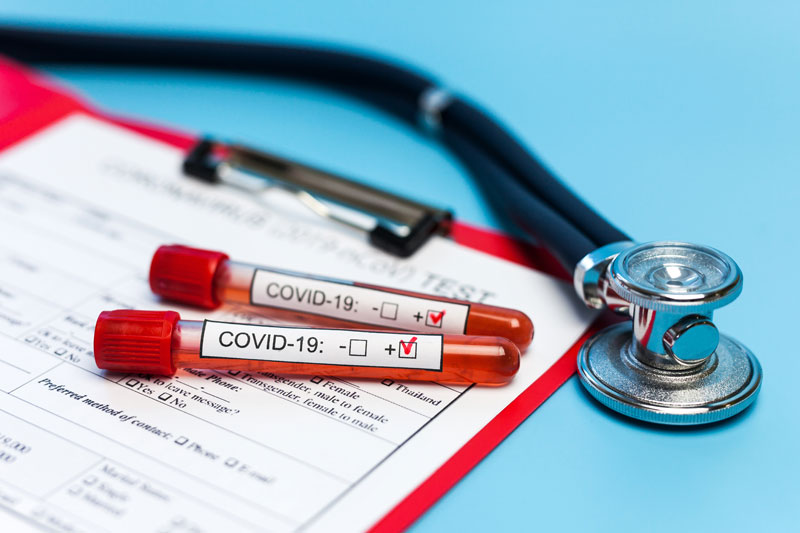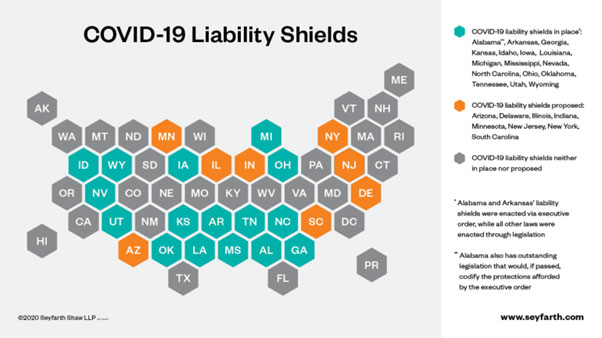Legislation to limit civil liability for COVID-19 has been enacted in many U.S. states, with a view to protect businesses and property owners from coronavirus-related liability lawsuits. Just as for other personal injury cases, COVID-19-related cases also involve medical claims review to validate the legitimacy of the claim. More diligence is required on the part of the reviewers to ensure that the claim is not a fraudulent one. The COVID-19 shield laws do not define legal terminology such as “gross negligence” and so the statutory definition or common law of each state would apply. Another important thing is that the immunity offered by the shield laws is not extended to criminal and workers’ compensation cases.
Businesses that are compliant with federal and state guidance – this includes the guidelines issued by OSHA, the CDC, or the individual state Department of Health – will be provided the liability shield protection for claims that are made by people alleging they were affected by the virus on the business’ premises. Some states have also included specific disclaimer language to include on signage to preserve legal defenses. Among the states that have started implementing COVID-19 related immunity legislation are Alabama, Arkansas, Georgia, Iowa, Kansas, Louisiana, Mississippi, North Carolina, Ohio, Oklahoma, Utah and Wyoming. While the regulation covers omissions/acts arising after the date of the emergency order in some states, in others the laws are effective from and after the date of adoption of the regulation.
(Source: https://www.seyfarth.com/news-insights/covid-19-liability-shields-todays-legislative-trend-tomorrows-legal-defense.html)
Though the state liability protection clauses are not identical, there are some common provisions and differences to note to understand the impact of these liability shields.
- Protection from liability for whom? Though earlier, the liability coverage was for healthcare providers, PPE manufacturers and first responders, as the economy reopened the protection was extended to cover “main street” businesses. Though in most states, most of the new regulations do not limit the type of business or its legal structure, North Carolina targets “essential businesses”. Some state laws provide special treatment for property owners and food preparation businesses.
- When the immunity doesn’t apply: The immunity is lost if the business is found to be grossly negligent. Typically states do not provide immunity for businesses that have shown “gross negligence, intentional infliction of harm, and reckless misconduct.” In Iowa and Mississippi, the negligence factor has been removed and the exception narrowed to “actual malice” or “intentional misconduct.” Kansas and Oklahoma have taken the stance that businesses complying with health and safety laws can be provided immunity irrespective of other behavior.
- Whether the business is compliant with applicable health and safety regulations: This is a serious consideration because states vary regarding compliance standards. Though most state laws require businesses to follow relevant health and safety laws, states like Georgia, Utah, and Idaho don’t have such references. States also differ as regards the extent of compliance needed for protection. While Louisiana, Kansas, and Nevada require “substantial compliance,” Mississippi, Oklahoma and Wyoming have a “good faith” compliance standard. Such differences in regulations could have considerable impact on liability.
- Dates applicable: For most states, the immunity applies to exposures starting anywhere from January 1, 2020 to early March, depending on the state. The laws will remain in effect through mid-2021 or until the health emergency is no longer in effect in the particular state. Kansas is an exception in this regard because the immunity expires on January 26, 2021 in that state.
- Presumptions and notices: Some states such as Georgia (that are not dependent on compliance with health guidance) require businesses to issue certain waivers and warnings /or post COVID-19 risk notice if they are to benefit from a presumption that visitors assumed the risk. These notices are to be posted at their entrances, or on receipts/tickets provided to people who enter their premises. There are specific criteria, or language provided by state statute, set out for such notices. However, in the event of gross negligence, willful misconduct, or reckless /intentional infliction of harm, the protection is lost.
- Plaintiffs barred from filing: In some states such as Tennessee, state shields bar plaintiffs from filing a COVID-19 lawsuit unless they provide a statement from a physician along with their complaint. This statement should state that the plaintiff’s injuries were caused by the business named in the lawsuit.
- Posting about the business’ risk mitigation measures: Some states like North Carolina provide extra protection to businesses that can prove that they complied with applicable posting requirements.
- Limitation regarding damages: In some U.S. states like Alabama, limitations are applied on the damages a plaintiff can seek when the COVID shield’s immunity doesn’t apply.
Here are some of the common features shared by state liability shields though there are many differences.
- The liability shields protect businesses and their employees from civil suits associated with actual or potential exposure to COVID-19.
- Protection is not provided for intentional, reckless or grossly negligent misconduct
- The liability shield doesn’t prevent employees from filing workers’ compensation claims connected with actual or potential exposure to the virus at the workplace.
It is likely that we will witness large-scale COVID-19-related litigation, which would in turn increase the demand for medical review solutions and related processes. Meanwhile, COVID-19 shields are expected protect businesses, employees and consumers. The shields vary with regard to the businesses they apply to and what types of actions or omissions they shield. Overall, we can say that businesses are likely to face lawsuits associated with COVID-19 exposure, whether actual or potential; businesses will not be liable for claims involving ordinary negligence; also, businesses may be able to use things such as their own good faith efforts to comply with public health guidance, compliance with posting laws, and procedural prerequisites for plaintiffs filing a lawsuit, to limit liability.





